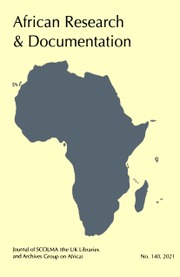Article contents
State versus documentation: access to anti-apartheid viewpoints from within South Africa
Published online by Cambridge University Press: 25 April 2022
Extract
The purpose of this article is to highlight the significance of publication of antiapartheid periodicals within South Africa; to describe some of the difficulties under which researchers, writers and publishers operate; to attempt a categorization of this type of material; and to explain why the documentalist and indexer plays an important role in the study and understanding of present, and future, South African society. Excluded from this survey are literary and creative publications which could also be classified as anti-apartheid.
There exists in South Africa a long and honourable tradition of antiapartheid periodical publishing. The response from those who hold the reins of power has been a vigorous campaign of censorship which, in the context of South Africa's political economy, may be seen as a logical necessity.
Information
- Type
- Articles
- Information
- Copyright
- Copyright © African Research & Documentation 1989
References
- 2
- Cited by

